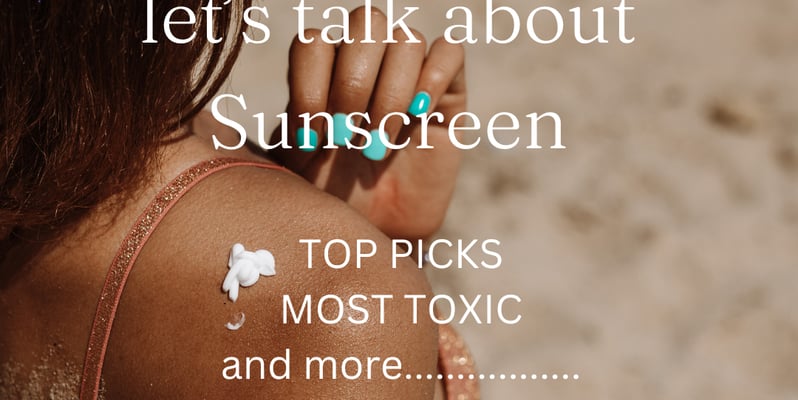For a Limited Time only - GET YOUR FREE GIFT A PAB - PORTABLE AIR BRUSH WITH ANY ORDER FOR THE MONTH OF JUNE

The TRUTH about Sunscreen
It’s no secret that the sun (in moderate doses) provides all sorts of health benefits! Sunscreen is so important for longer than 20 minutes in the sun. But there are some toxic sunscreens
Cate- Love your Face
1/29/20244 min read



It’s no secret that the sun (in moderate doses) provides all sorts of health benefits, including helping our bodies manufacture vital vitamin D. Many people are looking for the best sunscreens to cut their risk of sun overexposure, sunburns and possibly skin cancer.
Beyond that, sunscreen is unique compared to many other personal care products because you coat it thickly onto your skin, often multiple times a day. You don’t get that type of hours-long, skin-absorbing exposure with something like, say, shampoo you quickly wash off.
That’s why it’s very important to look for safer sunscreens if you use them and to recognize that you can’t only rely on sunscreens alone to prevent sun overexposure. Cover up, hats, umbrellas, long sleeve bathing suits etc…
No product is going to be fully protective, and no product will last on your skin for more than two hours max. Applying a thick layer sunscreen, reapplying every time you’re out of the water and therefore choosing a better product to begin with is very important Even “water-resistant” sunscreen should be applied after exiting the water.
Your skin is your body’s largest immune system organ. Excess sun exposure can impair the immune system, but many sunscreen chemicals are readily absorbed into the bloodstream, where they could cause ill effects, too.
Which is more harmful Ultraviolet UVA or UVB rays?
The sun gives off two kinds of potentially damaging rays. UVA light and is associated with skin aging and other markers of aging, while UVB light is the primary cause of sunburn. Both can contribute to skin cancer, so effective sunscreens must block both.
What are the differences between UVA and UVB?
UVA rays form 95% of the UV radiation which reaches the earth. They have a role to play in the formation of some types of skin cancers. UVB rays have slightly more energy than UVA rays. They have a short wavelength that can only reach the outer layer of your skin called the epidermis.
Does sunscreen block both UVA and UVB?
Broad Spectrum: It's essential for your sunscreen to offer broad spectrum protection, which means that it offers effective protection against both UVA (ultraviolet A) and UVB (ultraviolet B) rays, the solar wavelengths proven to damage the skin. Without the words “broad spectrum” your sunscreen likely doesn't offer coverage from UVA. Most active ingredients in sunscreen shield against UVB, but far fewer have UVA coverage, and only a handful offer both.
What SPF blocks the highest amount of UVB?
The highest SPF is 100 and blocks out 99% of UVB rays. But experts don't necessarily think SPF 100 sunscreen is the best choice. This is only slightly better than SPF 30 and 50 (which is blocks 98% of UVB rays).
What is the bad side of sunscreen?
Some ingredients of sunscreens can cause the skin to become more sensitive. If a sunscreen causes redness or irritation, wash it off and stop using it. Talk to your doctor or pharmacist about using another sunscreen product with different ingredients.
“Based on the best current science and toxicology data, we continue to recommend sunscreens with the mineral active ingredients zinc oxide and titanium dioxide, because they are the only two ingredients the FDA recognized as safe or effective in their proposed draft rules,” Burns says.
Spray sunscreens contain cancer-causing benzene, so you should avoid them and please don’t inhale them.
The sunscreen chemicals tested in this FDA study included avobenzone, oxybenzone, octocrylene, homosalate, octisalate and octinoxate, and all six active ingredients tested readily absorbed into the bloodstream of humans involved the study — and at concentrations that surpass an important FDA safety threshold.
Oxybenzone is in widespread use in American chemical-based sunscreens. Lab testing shows skin penetration rates of 1 percent to 9 percent. That’s concerning, given the fact that it acts like an estrogen in the body and is linked to abnormal sperm function in animal studies and endometriosis in studies of women. Oxybenzone also acts as a skin allergen in a significant number of people. (So does methylisothiazolinone, a common sunscreen preservative found in the majority of products surveyed.) Thankfully, places like Hawaii and Key West have banned oxybenzone in sunscreen due to its ability to bleach and kill coral reefs.
What is the safest sunscreen?
Our Top Picks for Healthy, Non-Toxic Sunscreen:
1. ATTITUDE Mineral Face Sunscreen, DPF 30
2. Badger Balm Natural & Organic Mineral Sunscreen
3. Solara Suncare Clean Freak Nutrient Boosted Daily Sunscreen, Unscented, SPF 30
4. Babo Botanicals Clear Zinc Sunscreen Stick.
5. True Botanicals Everyday Skin Tints, SPF 30
6. Luminance Skincare Sunscreen.
7. Earth Mama Organics Sunscreen.
8. Kari Gran Sunscreen.
Most Toxic Sunscreens to Avoid
1. Neutrogena Beach Defense Water + Sun Protection Sunscreen Spray, SPF 70.
2. Hawaiian Tropic Weightless Hydration Sunscreen Clear Spray, SPF 70.
3. Bare Republic Clearscreen Sunscreen Spray, SPF 100.
4. La Roche-Posay Anthelios Ultra Light Sunscreen Lotion Spray, SPF 60
5. Australian Gold Botanical Natural Sunscreen Spray, SPF 70
6. Banana Boat Ultra Sport Clear Sunscreen Spray or Lotion, SPF 100
7. CVS Health Ultra Sheer Sunscreen Lotion, SPF 100
8. Alba Botanica Hawaiian Sunscreen Spray, Fragrance Free, SPF 70
9. Banana Boat Ultra Sport Clear Sunscreen Spray, SPF 65
10. The Seaweed Bath Co. Sport+ Cooling Mist, Peppermint & Aloe, SPF 60
11. Panama Jack Sunscreen Lotion, SPF 100
12. Equate Beauty Ultra Light Sunscreen Lotion, SPF 100
Top Picks for the Best Baby Sunscreens (and Overall Kid-Friendly Picks)
1. ATTITUDE Mineral Sunscreen Stick, Kids, Unscented, SPF 30
2. Babo Botanicals Baby Skin Mineral Sunscreen Lotion, SPF 50

